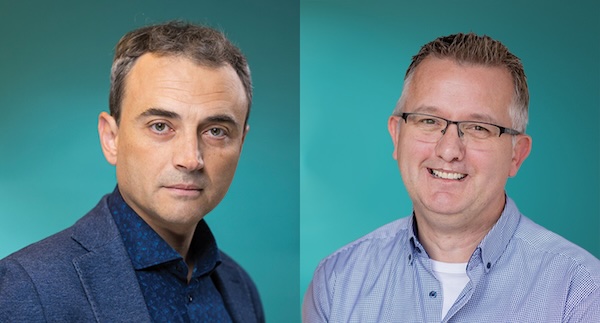
Gavril Farkas (left) © Kay Herschelmann | Peter Bank © Felix Noak
The new Research Training Group (RTG 2965) in algebraic geometry “From geometry to numbers: Moduli, Hodge theory, rational points”
The new RTG is jointly run by the Leibniz Universität Hannover and the Humboldt-Universität zu Berlin. Stefan Schreieder from Hannover is the spokesperson of the RTG, and Gavril Farkas, Berlin Mathematical School’s co-chair and MATH+ Distinguished Fellow from the Humboldt-Universität zu Berlin, is the co-spokesperson. Apart from Gavril Farkas, the Humboldt-Universität is represented in the RTG with another four PIs, also all MATH+ members, namely Gaetan Borot, Bruno Klingler (also MATH+ Distinguished Fellow), Thomas Krämer, and Angela Ortega.
The PhD training in the RTG will run from 01 October 2024 until 30 September 2029, and the DFG will fund 20 PhD positions each for a duration of four years, distributed evenly between the two participating universities.
The guiding principle of the RTG is the interplay between geometry and numbers. A first manifestation of this idea is the fact that geometric objects can be assigned algebraic invariants and, in particular, numbers, which often play an important role in classification. Examples are given by Hodge numbers, by intersection numbers on moduli spaces, or by the number of rational points.
The research program rests on three main pillars for which the groups in Berlin and Hannover are world experts:
• Hodge theory and topology of algebraic varieties;
• Geometry and combinatorics of moduli;
• Arithmetic of moduli and rational points.
The International Research Training Group Berlin-Oxford (IRTG 2544) „Stochastic Analysis in Interaction“ enters its second stage of funding
The IRTG is jointly operated by Technische Universität Berlin and the University of Oxford, led by MATH+ member Peter Bank from Berlin and Terry Lyons from Oxford. The further funding means that the successful collaboration between Berlin and Oxford in this mathematical field over the past four and a half years will continue. In particular, it enables PhD students from Berlin and Oxford to visit each other’s institution for months at a time. This IRTG will receive over four million euros in funding from the German Research Foundation (DFG) for another four and a half years.
Since April 2020, the PhD students of the international graduate school "Stochastic Analysis in Interaction" have been investigating mathematical questions concerning random systems, as they appear in many models of biology, physics, or finance. "Our graduates from the first phase of funding have, for example, contributed to the mathematical foundations of a better understanding of Bose-Einstein condensation and have also developed numerical methods for dealing with very current models for fluctuations in financial markets," says Peter Bank, who heads the field of financial mathematics at TU Berlin. "But also, at least at first glance, purely mathematical contributions to the integration theory of rough paths have been made and have even been awarded with one of the doctoral prizes of the Excellence Cluster MATH+," he adds.
The second funding period will allow the current PhD students, as well as those of a third doctoral group, to complete an equally varied and in-depth training and research program. "We can now follow up on the 14 workshops, the more than 80 lectures given by invited researchers from all over the world, the mini-courses, and the Berlin-Oxford summer schools from the first funding phase with further highlights," says Peter Bank, adding: "And our PhD students will continue to gain international experience. They have already been a flagship of the Berlin research landscape, having held over 200 presentations internationally."
(Source IRTG: TU Berlin Press Release, in German)
---
Research Training Groups (RTG), funded by the German Research Foundation (DFG)
RTG are established by universities to support the development of early career researchers. The groups receive funding from the DFG for a maximum of nine years. Their primary focus lies on the qualification of doctoral researchers within the framework of a focused research program and a structured training framework. Research Training Groups that embrace interdisciplinary collaboration are highly encouraged. The objective is to equip doctoral candidates with the skills to navigate the complexities of the science and academic job markets while fostering their early scientific independence.





















